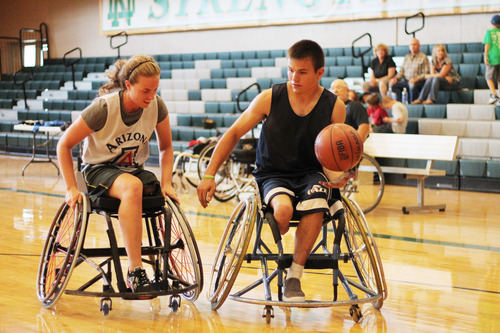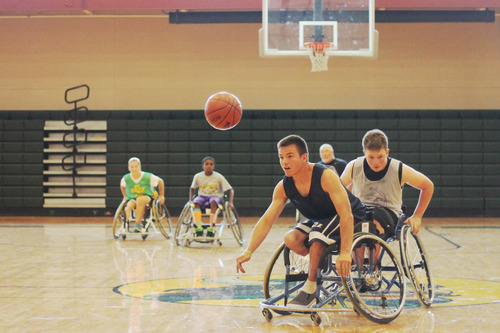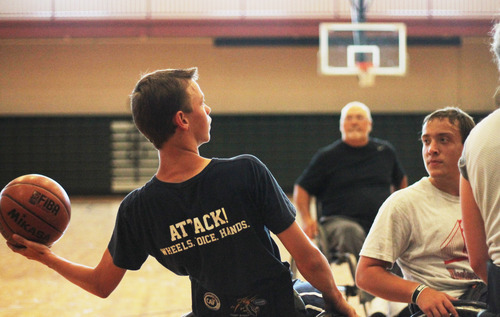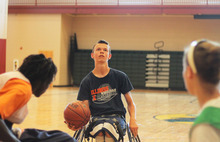This is an archived article that was published on sltrib.com in 2012, and information in the article may be outdated. It is provided only for personal research purposes and may not be reprinted.
Start with the wheelchair — 21 pounds of rubber and aluminum, wheels angled out for stability and quickness. Now look closer and notice the missing spokes. Look again for the deep scratches, stretching scarlike across the front bumper.
No, those who use these chairs aren't shy about abusing them. A game of wheelchair basketball isn't complete without plenty of collisions — the chairs as proxies for players who, for one reason or another, don't have full use of their legs.
"You can tell they love it. They're not afraid to fall over in the chairs," says Marilyn Blakley, who helps coach the Jr. Wheelin' Jazz. The team practices primarily out of Midvale's Copperview Recreation Center, but also splits some time in Clearfield.
The chairs cost as much as $3,500. They start wearing out in about two years, with limited warranties that run through three. They also help their occupants secure full college scholarships.
Three years ago, Blakley helped found the Jr. Wheelin' Jazz as Utah's first National Wheelchair Basketball Association junior team. In its first season, the team was ranked No. 21 nationally. In March, it finished sixth at the NWBA Championships in Colorado Springs.
Soon, four members of its first graduating class will extend their careers while enjoying a free education: Ryan Nelson to Wisconsin-Whitewater; Eliza McIntosh to Alabama; Spencer Heslop to Illinois; and Blakley's son, Sam, also to Illinois after serving an LDS Church mission in Anaheim, Calif.
Only seven collegiate men's teams and five women's teams exist across the country, which means the Wheelin' Jazz teammates will soon become familiar rivals. By waiving out-of-state tuition and patchworking academic scholarships with aid from on-campus vocational rehab programs, the schools are able to provide students with five years of athletic eligibility.
"I was shocked we could even play in college," Sam Blakley says. "I didn't know. I was really excited. … I didn't even think about college, to be honest with you, until wheelchair basketball."
Though not governed by the NCAA, the recruiting process is surprisingly similar to what able-bodied athletes go through. Students can attend elite camps, such as one hosted by Illinois — one of the country's pioneers in disability sports. Prospective athletes choose from a smaller pool of schools, but base their decisions on many of the same criteria as Division I athletes.
"For me, a big part of it was the coaching staff," Heslop says. "They always were checking on me, seeing how I was doing. They welcomed me."
At the junior level, the cost of travel and tournament fees runs to around $2,000 per player. The heaviest financial burden is the wheelchair and the cost of maintenance and repair. Wheels cost roughly $800 a pair. The spokes are usually the first parts to break.
There is no booster program in place for the Jr. Wheelin' Jazz. To defray out-of-pocket costs, the team tries to land sponsorships with local organizations, often relying on companies where team parents work. A celebrity fundraiser in April that featured former Brigham Young University star and National Basketball Association player Shawn Bradley raised around $9,000; the money was split between the junior team and the championship-division Wheelin' Jazz, founded in 1989.
Some of the schools will provide new wheelchairs for incoming students, which means their used chairs can be sold or donated to the younger players still on the junior team.
Another incidental benefit: In about eight years, the junior players intend to be back in Utah playing with the adults.
"We'll have a championship team," Marilyn Blakley says. —
About Jr. Wheelin' Jazz
Four members of the Jr. Wheelin' Jazz have earned full scholarships to play in college.
The Jr. Wheelin' Jazz was founded in 2009 as Utah's first junior-level team sanctioned by the National Wheelchair Basketball Association.
The team was ranked No. 21 nationally in its first season, but recently finished sixth at the national championships.









